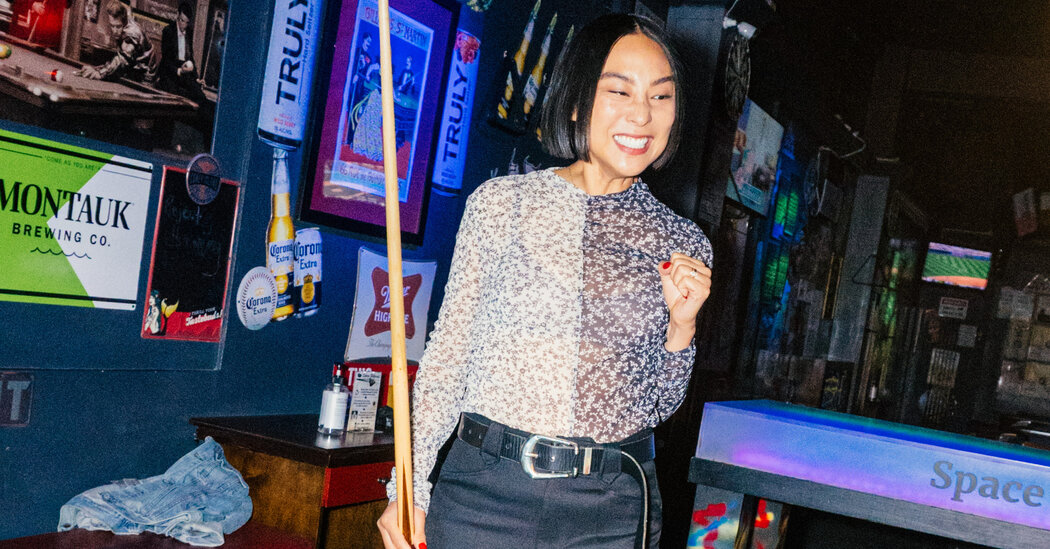
“I like to find the most impossible shot and then get really disappointed when it doesn’t happen,” the actress Greta Lee said, leaning over a billiards table in the Koreatown section of Manhattan. “I don’t know what that says about me.”
She aimed at a solid red ball, which obediently dropped into a center pocket. Ms. Lee allowed herself a brief celebration: “Mommy’s still got it, OK?”
This was on a recent Wednesday evening, just before the premiere of the second season of the Netflix drama “Russian Doll,” in which Ms. Lee, 39, stars as Maxine, a best friend of Natasha Lyonne’s time-trapped Nadia. A standout of the first season (people approach her on the street, parroting Maxine’s tag line, “Sweet birthday baybeeee”), Ms. Lee returns with a deeper performance, in delirious outfits and statement eyeliner.
She is also a star of the Apple TV+ drama “The Morning Show, in which she plays Stella Bak, a tech genius and network president who favors Balenciaga and vintage Chanel.
For this outing, she had dressed down — wide-legged pants and diaphanous blouse, worn under a daffodil duster, with a Prada fanny pack to match — and had taken a car to this block of West 32nd Street where she and her husband, the comedy writer Russ Armstrong, had passed a lot of hazy evenings in their 20s. The couple, who relocated to Los Angeles during the pandemic, have two sons, 3 and 5, so the nights are hazy for different reasons.
Ms. Lee began the night at the Korean grocery H Mart. In her 20s, as a California transplant making her Broadway debut, she had prowled its aisles for delicacies that reminded her of home. On this night, she filled her cart with an orange drink, an Asian pear drink, a sponge cake.
“This is where you cross the threshold with your white friends who say they love Korean food and then you serve them this,” she said, pointing to some fried anchovies. Then she went in search of strawberry Pocky and dried squid.
Mr. Armstrong, who had been catching up on work, met her in the snack aisle, just as she was reaching for a bag of sweet corn chips. “We have an industrial supply of these at home,” he said approvingly.
Groceries paid for, they made their way down the block to Woorijip, a popular cafe that serves premade Korean comfort foods. “Any time of night, it could give you everything you needed,” Mr. Armstrong said nostalgically.
The cafe had made a few improvements since they last frequented it. “I have mixed feelings about this,” Ms. Lee said. “Because it’s so much nicer than it used to be.”
They loaded a tray with Korean sushi, an omelet, a kimchi stew. “This stew tastes exactly the same,” Mr. Armstrong said. “It’s 5 percent saltier than it should be, which is exactly how I like it.”
Ms. Lee dipped a spoon in. “Oh yeah,” she said. “There’s so much MSG. Just how our grandmothers intended.”
Fortified, they headed to Space Billiards, a 12th floor pool hall hung with orange lanterns. They tried to order Korean beers, but they were sold out, so they settled at a table with a Heineken and a Budweiser. Ms. Lee tested out a cue. She said that she hadn’t played in a while.
She played a lot as a Los Angeles teenager, mostly in Koreatown pool halls, trying to impress Koreatown boys. As a student at Harvard-Westlake, a prestigious secondary school, she learned code switching early on, wearing poofy dresses to her white friends’ sweet 16 birthday parties and giant cargo pants to the pool halls after.
That ability to inhabit different roles has served her career well, in supporting roles in shows such as “Inside Amy Schumer,” “High Maintenance” and “Girls.” She has a particular talent for satirizing privilege and entitlement.
As an oddball character actress, she has rarely played roles that felt true to her own experience, she said. That will change with “Past Lives,” a romantic drama due later this year, in which Ms. Lee plays a first-generation immigrant who reconnects with a childhood sweetheart. She is also developing the essay collection “Minor Feelings: An Asian American Reckoning” for series television. She plans to star in it.
“I’m not hiding,” she said of her work on “Past Lives.” “And that is really scary for me, because maybe I’ve been hiding a part of myself behind these characters. And I don’t know if people are going to be receptive to this version of me.”
For now, Ms. Lee had a different role to play: pool shark. She is a devotee of Jeanette Lee, the Korean American professional pool player. “I’m going to act like I know what I’m doing,” she said.
Mr. Armstrong broke. Ms. Lee sunk a ball. They traded shots back and forth, her long red nails gripping the cue. “With your nails and the full outfit it’s an intimidation thing,” Mr. Armstrong said.
But her performance was not so threatening. “I’m trying to make all of those K-Town boys proud,” Ms. Lee said as she lined up a shot. She missed. “Never do anything to try to impress someone else,” she said.
She undershot. Then she overshot. “I was so good at geometry,” she said. “What happened to me?”
It look her a few rounds of 8-ball, but she seemed to hit her stride. “No more messing around, let’s do this,” she said, aiming for the corner pocket. She soon cleared the table as Mr. Armstrong, who had several balls remaining, looked on approvingly.
“I didn’t think I was going to win,” Ms. Lee said.
“I knew you were going to win,” Mr. Armstrong said, congratulating her. “I always bet on you.”






